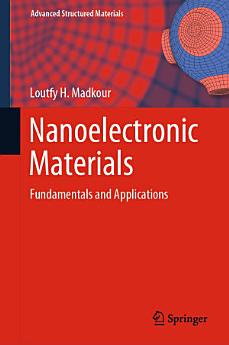Nanoelectronic Materials: Fundamentals and Applications
Giới thiệu về sách điện tử này
In turn, the book considers the environmental impact of nanotechnology and novel applications in the mechanical industries, energy harvesting, clean energy, manufacturing materials, electronics, transistors, health and medical therapy. In closing, it addresses the combination of biological systems with nanoelectronics and highlights examples of nanoelectronic–cell interfaces and other advanced medical applications.
The book answers the following questions:
• What is different at the nanoscale?
• What is new about nanoscience?
• What are nanomaterials (NMs)?• What are the fundamental issues in nanomaterials?
• Where are nanomaterials found?
• What nanomaterials exist in nature?• What is the importance of NMs in our lives?
• Why so much interest in nanomaterials?
• What is at nanoscale in nanomaterials?• What is graphene?
• Are pure low-dimensional systems interesting and worth pursuing?
• Are nanotechnology products currently available?• What are sensors?
• How can Artificial Intelligence (AI) and nanotechnology work together?
• What are the recent advances in nanoelectronic materials?• What are the latest applications of NMs?
Xếp hạng và đánh giá
Giới thiệu tác giả
Dr. LOUTFY H. MADKOUR has been a Professor of Physical Chemistry and Nano Science at the Department of Chemistry, Faculty of Science, Al Baha University, Saudi Arabia, since 2012. He received his B.Sc., M.Sc. and Ph.D. in Physical Chemistry from Cairo University, Minia University and Tanta University (Egypt), respectively. He began working as a Lecturer in Chemistry at Tanta University in 1982 and as a Professor of Physical Chemistry in 1999. He has conducted a series of studies in the fields of electrochemistry, corrosion science, density functional theory, molecular dynamic simulation, nanoscience, nanotechnology, nanomedicine, analytical chemistry, polarography, electrolytic extraction of heavy metals from natural ores and deposits, electrochemical thermodynamics and environmental chemistry. His previous research accomplishments include the biosynthesis of metallic nanoparticles (MNPs) and toxicology studies for pharmacological applications in medicine and therapy. He has published 150 peer-reviewed original research articles, 11 review articles, and 4 books on physical chemistry, practical and applied chemistry, corrosion science, nanoscience and nanomedicine.
Prof. Madkour is an Editorial Board member for several international journals, e.g. the International Journal of Industrial Chemistry (IJIC); International Journal of Ground Sediment & Water; Global Drugs and Therapeutics (GDT); Journal of Targeted Drug Delivery; Journal of Clinical and Medical Research; and International Journal of Environmental Chemistry. In addition to serving as a Reviewer for many international ELSEVIER and SPRINGER journals, he is a member of many prestigious international societies, including the American Association for the Advancement of Science (AAAS), European Desalination Society (EDS), Egyptian Chemical Society (ECS), Egyptian Corrosion Bulletin Society and American Chemical Society (ACS).







